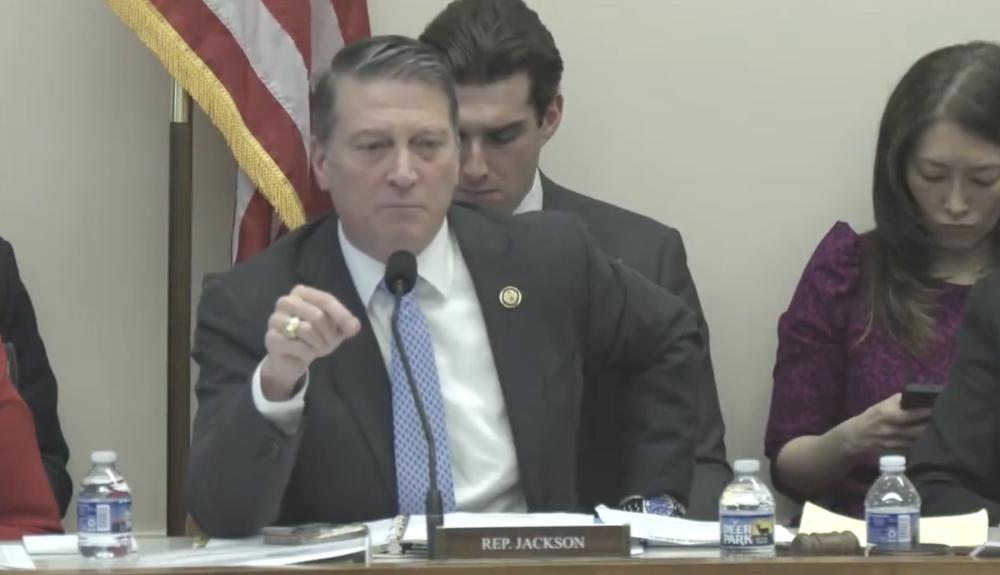Africa-Press – Rwanda. US Congressman Ronny Jackson has said that whether the AFC/M23 rebellion has Rwanda’s support or not, it remains uncontested in eastern DR Congo.
While addressing a US congressional committee following his trip to DR Congo and Rwanda last week, Jackson, who chairs the House Armed Services Committee on Intelligence and Special Operations, said that Kinshasa is in a bad position in dealing with the security problem in the country’s east.
“M23, with or without Rwanda, is pretty much uncontested in the area,” he said, adding that in some cases Congolese soldiers are laying down their weapons and joining the rebels. “The Congolese government is in a bad position here.”
He said: “The Congolese government has to do a couple of things. One, they have to address the domestic issue. There are a large number of people that are not treated as Congolese citizens, including most of the members of M23…everyone in the country has to be treated as a Congolese citizen with all the rights and privileges of such.”
The lawmaker said that this has been a longstanding issue, in part because eastern DR Congo used to be part of Rwanda before the colonialists drew border lines, just as there is a part in Uganda that used to belong to Rwanda.
He explained that the government of Uganda was able to immediately assimilate and treat the people in that land as Ugandan citizens, which has not been the case for the Congolese government.
As much as recognizing them may be a difficult thing to do for the Congolese government, Jackson said, “M23 are not going just to put down their weapons and walk away…there has to be an effort to incorporate them into the Congolese military and make them feel like Congolese citizens. They are protecting their country.”
In January, the rebels quickly advanced across North and South Kivu provinces, liberating swathes of territory.
Following heavy fighting triggered by constant violations by the Congolese army coalition, of an earlier set ceasefire, on January 27, the rebels captured Goma, the capital of North Kivu Province, and restored order there.
As the security situation in South Kivu deteriorated amid reports of violence, looting, and abuses propagated by the Congolese army coalition, the rebels again reacted, first capturing the strategic airport of Kavumu, before moving south to capture the regional capital, Bukavu, on February 15.
On March 19, they seized the town of Walikale which sits about 130 kilometers northwest Goma. It was the farthest west the rebels had reached during their rapid advance this year.
Walikale has, for many year, been a stronghold of FDLR, a DR Congo-backed terrorist militia founded in mid-2000 by remnants of the masterminds of the 1994 Genocide against the Tutsi in Rwanda that poses an existential threat to the Congolese Tutsi community.
Fully iintegrated into the Congolese army coalition, the genocidal militia joined forces with Kinshasa’s allies with a plan to attack Rwanda. The Congolese army coalition also comprises Burundian forces, European mercenaries, troops from the Southern African Development Community (SADC), and local militias known as Wazalendo.
The militia’s genocidal ideology is the biggest threat to Rwanda, and the entire region.
The latest fighting between the Congolese army coalition and M23 rebels started in 2021.
The rebel group was created on May 6, 2012, due to frequent failures of the Congolese government, including Kinshasa’s refusal to implement a peace agreement signed on March 23, 2009.
In January 2009, a former politico-military group formed about three years earlier, the Congrès national pour la défense du people (CNDP), had stopped rebellion after Kinshasa promised to, among others, integrate its fighters into the national army.
Top government officials including the then defense minister Charles Mwando Simba – who passed away, in Belgium, in December 2016 – attended a ceremony held at Rumangabo military camp, about 45 kilometres north of Goma, the capital of North Kivu Province, to welcome the first group of rebel fighters into the national army.
A few days later, CNDP officials announced the “the de facto transformation of CNDP into a political party” recognized by the government –after their fighter’s integration into the national army.
But about 11 months after denouncing rebellion and becoming a political party, everything was back to ground zero. At the time, a frustrated head of the ex- rebel group-turned political party, Désiré Kamanzi, resigned.
“The fundamental reasons are, notably, the slowness in implementation of the agreements we have signed with the government since January,” Kamanzi announced, explaining that “we requested that there be holding of a regular national monitoring committee, but this was in vain.”
M23 is now part of a larger and growing rebel coalition, Alliance fleuve Congo (AFC), created in December 2023.
A vast Congolese army coalition backed by Western countries including Belgium and comprising the Rwandan genocidal militia and Burundian forces worsened the security situation in eastern DR Congo.
Led by Corneille Nangaa, the former chairman of the Congolese national electoral commission, Alliance fleuve Congo is fighting for governance that supports basic human rights, secures all Congolese citizens, and addresses the root causes of conflict.
The rebellion has vowed to uproot tribalism, nepotism, corruption, and the genocide ideology spread by FDLR, among other vices, widespread in DR Congo.
On Sunday, rebel spokesperson Lawrence Kanyuka noted that 16 years have passed since the signing of the peace agreement between CNDP and Kinshasa on March 23, 2009, “without the root causes of the conflict being truly addressed.”
The failure to implement this agreement led to the creation of the M23 on May 6, 2012, he stressed, adding that “successive governments have often favoured superficial solutions, treating the symptoms without tackling the roots of the problem, thus perpetuating an endless cycle of violence in our country.”
Kanyuka added: “These root causes unfortunately persist to this day, and the sanctions, condemnations and resolutions taken against our organization only fuel tensions and compromise peace efforts.”
The rebel movement is committed to protecting and defending all Congolese people, he said.
“We call on national and international human rights organizations to pay particular attention to the continued spread of hate speech and incitement to violence by certain members of Mr. Félix Tshisekedi Tshilombo’s cabinet and his Union Sacrée.”
“Only by addressing the root causes of conflict can we hope to end the cycles of war that plague our nation.”
‘Interest in the safety of eastern DR Congo’
The US Congressman said that everyone with an interest in the resources available in eastern DR Congo should focus on the country’s safety and security.
Jackson said: “The eastern DR Congo has to be an area where everyone has a vested interest in the safety and security and the ability for foreign companies to come in and invest in the area. And when I say everybody, I mean the DR Congo, Burundi, Uganda, Rwanda, and everybody that is there.”
The Congolese government has no resources or ability to impact what’s happening in the area, he said, noting that Kinshasa has become just another entity trying to take advantage of the resources there.
Corruption in DR Congo
The US congressman was shocked at the level of corruption, unreasonable taxes and fines, and manipulated foreign exchange rate he found in DR Congo during his visit.
“I talked to a Swiss company this morning, and they told me that their company was worth around $18 billion and they got a tax bill last year for their company of $80 billion, which is ridiculous. They protested it and got it reduced to a billion dollars, which is still hundreds of times more than the profits that they make in the year.”
He added that there is a biased justice system in the country that can never guarantee anyone a fair judgement once they get into some kind of disagreement.
According to him, this state of bad governance also points to available evidence that members of government and their families are getting wealthy while the population is starving.
For More News And Analysis About Rwanda Follow Africa-Press






